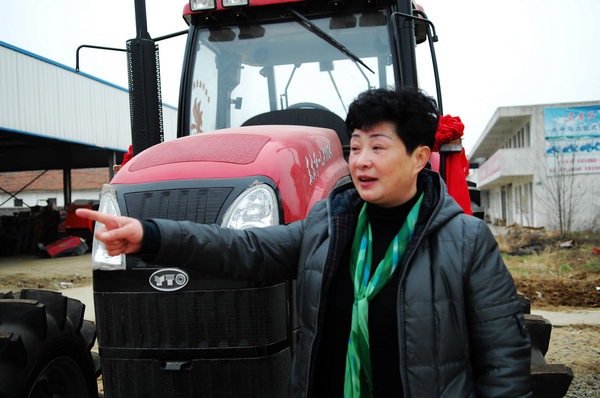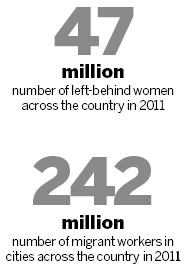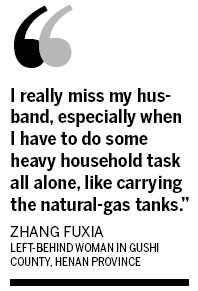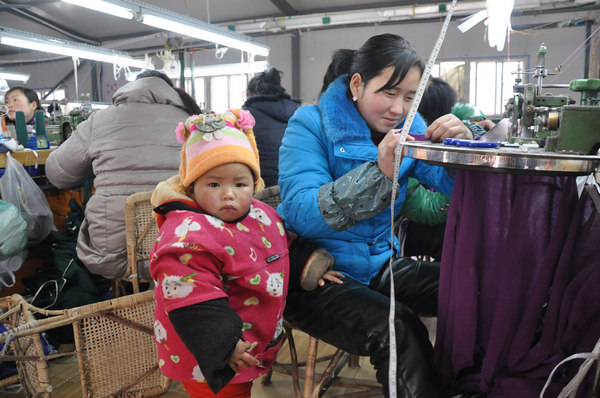Left-behind women keep homes running
Updated: 2012-03-07 08:04
By An Baijie and Xiang Mingchao (China Daily)
|
||||||||
As husbands seek better-paid urban jobs, wives tend to elderly, children
Zhang Fuxia, a "left-behind" village woman, has been able to contribute more to her family's earnings for the past two years since a factory opened in her hometown in Henan province.
Zhang, 45, whose husband has been a migrant worker for more than 20 years in Hefei, capital of neighboring Anhui province, shoulders the main family responsibilities on her own - taking care of her daughter and parents-in-law, who live with her in the village.
 |
|
Zhang Mo, a left-behind woman, is an entrepreneur starting from scratch in Gushi county in Henan province. [Xiang Mingchao / China Daily] |
Women like Zhang, who stay at their rural homes while their husbands go to cities for better-paying jobs, are called left-behind women. They stay behind to take care of their children and parents, who would lose their rights to social security, education and medical insurance if they left their homes to live in the city.
Zhang's husband, Xiong Dehe, 48, can earn about 50,000 to 80,000 yuan ($7,930 to 12,700) a year working at construction for more than 10 hours a day seven days a week. That used to be the family's only income source.
 |
For the past two years, Zhang's 23-year-old son, who is unmarried, has earned about 20,000 yuan annually as a factory worker in Guangzhou, capital of South China's Guangdong province.
The family found another source of income in 2009, when a company producing car seats opened in Zhang's hometown of Fangji township, Gushi county. Zhang earns about 1,500 yuan a month sewing the seats in a workshop just a 10-minute walk from her home.
"I felt fulfilled (bringing more income to the family)," Zhang told China Daily on Friday.
Zhang's family is united for less than one month a year. When traditional festivals like the Mid-Autumn Festival and Spring Festival approach, her husband makes the 200-kilometer trip home to spend time with them.
Zhang said she wanted to go to the city with her husband, but her responsibilities in the family were so important that she could not leave.
"My parents-in-law are 84 and 77 years old, and both need to be taken care of all the time," Zhang said.
"My 11-year-old daughter goes to primary school, and I have to cook for her every day."
|
 |
More than half of the left-behind women contributed less than 30 percent of the family income, and most had to stay in their rural homes because they lacked the job skills urban companies were looking for, according to the report.
Hard task for women
Zhang, who for years has suffered from an inflamed gall bladder, said taking care of the children and parents-in-laws without her husband's help has not been easy.
"I really miss my husband, especially when I have to do some heavy household task all alone, like carrying the natural-gas tanks," she said.
The family gave up farming years ago because there was no time for it, especially since Zhang started working at the factory.
They rented out their 0.2-hectare plot to the other farmers in the village, and during harvest they get three sacks of rice from the tenants.
Zhang said she sometimes worries about her husband. "I am afraid he might drink too much wine with his work-mates, and I worry that it isn't safe for him to ride a bike in that urban area, where traffic accidents are reported from time to time."
There are 17 workers in Zhang's workshop, each a left-behind woman.
They compete with each other to earn as much as possible on the job, and after they get off, they all hurry home because "the children are waiting for their mums".
 |
|
A left-behind woman works at a clothes factory with her child in Henan province in February. [Xiang Mingchao / China Daily] |
Liu Lanmin, 43, who works with Zhang, said she could not go with her husband to work in Guangdong province because she has to take care of her 13-year-old son, who goes to primary school in the village.
"Although all the older people in my family have passed away and my daughter has married, I couldn't leave the village because my son still needs me," Liu said.
"It's good to work in a factory near my home," she said. "I can take care of my son every day, and I can work on the farmland whenever it's needed."

 Relief reaches isolated village
Relief reaches isolated village
 Rainfall poses new threats to quake-hit region
Rainfall poses new threats to quake-hit region
 Funerals begin for Boston bombing victims
Funerals begin for Boston bombing victims
 Quake takeaway from China's Air Force
Quake takeaway from China's Air Force
 Obama celebrates young inventors at science fair
Obama celebrates young inventors at science fair
 Earth Day marked around the world
Earth Day marked around the world
 Volunteer team helping students find sense of normalcy
Volunteer team helping students find sense of normalcy
 Ethnic groups quick to join rescue efforts
Ethnic groups quick to join rescue efforts
Most Viewed
Editor's Picks

|

|

|

|

|

|
Today's Top News
Health new priority for quake zone
Xi meets US top military officer
Japan's boats driven out of Diaoyu
China mulls online shopping legislation
Bird flu death toll rises to 22
Putin appoints new ambassador to China
Japanese ships blocked from Diaoyu Islands
Inspired by Guan, more Chinese pick up golf
US Weekly

|

|






